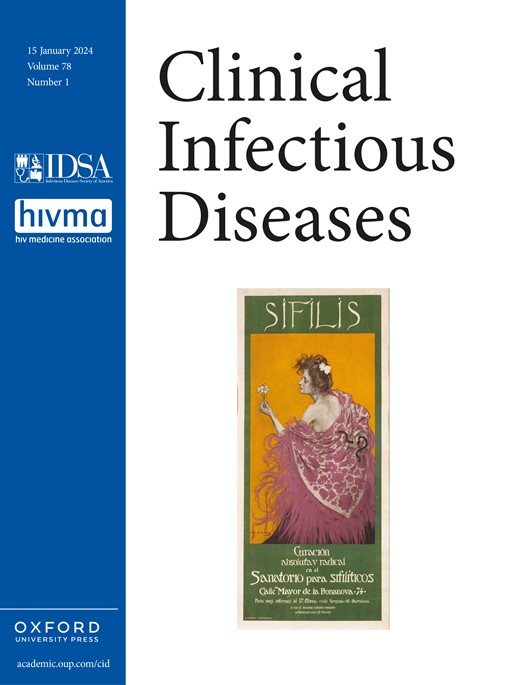妊娠对结核病治疗结果的影响:2016-2022年巴西国家监测数据分析
IF 8.2
1区 医学
Q1 IMMUNOLOGY
引用次数: 0
摘要
背景:每年有20多万孕妇患结核病。人们对怀孕对结核病结局的影响知之甚少。方法本研究使用巴西卫生部的监测数据。我们纳入了2016-2022年间新诊断为药物敏感结核病的11-49岁女性,接受一线抗结核方案治疗,治疗结果已知。使用多变量回归,我们估计了怀孕对(1)随访损失和(2)结核病治疗期间死亡的年龄分层影响。结果96,868例结核病患者中,1870例(1.9%)妊娠,79,361例(81.9%)未妊娠,15,637例(16.1%)妊娠状况不详。在孕妇中,治疗成功1432例(76.6%),失访358例(19.1%),死亡80例(4.3%)。在非孕妇中,79262例(83.4%)获得治疗成功,11582例(12.2%)失去随访,4154例(4.4%)死亡。在青少年中,怀孕导致随访失败(aOR 1.78, 95% CI: 1.29-2.44)和死亡(aOR 2.35, 95% CI: 1.27-4.37)的几率更高。与未怀孕的同龄孕妇相比,20-29岁和30-39岁的孕妇随访损失更多(分别为aOR 1.39, 95% CI: 1.17-1.66和aOR 1.79, 95% CI: 1.42-2.25),而40-49岁的孕妇更容易死亡(aOR 1.66, 95% CI: 1.04-2.66)。我们的分析揭示了妊娠与不良结核病治疗结果之间的显著关联,强调了医护人员需要为接受结核病治疗的孕妇提供加强的支持和监测。需要进一步的研究来确定这些发现的潜在原因。本文章由计算机程序翻译,如有差异,请以英文原文为准。
The Impact of Pregnancy on Tuberculosis Treatment Outcomes: An Analysis of Brazilian National Surveillance Data 2016-2022.
BACKGROUND
Over 200,000 pregnant people fall ill with tuberculosis (TB) annually. Little is known about the impact of pregnancy on TB outcomes.
METHODS
This study used surveillance data from Brazil's Ministry of Health. We included women 11-49 years old newly diagnosed with drug-susceptible TB disease between 2016-2022, treated with a first-line anti-TB regimen, and with a known treatment outcome. Using multivariable regression, we estimated the age-stratified effect of pregnancy on (1) loss to follow-up and (2) death during TB treatment.
RESULTS
Of 96,868 women with TB, 1870 (1.9%) were pregnant, 79,361 (81.9%) were not pregnant, and 15,637 (16.1%) had unknown pregnancy status. Among pregnant women, 1432 (76.6%) experienced treatment success, 358 (19.1%), lost to follow-up, and 80 (4.3%) died. Among non-pregnant women, 79,262 (83.4%) experienced treatment success, 11,582 (12.2%) were lost to follow-up, and 4,154 (4.4%) died. In adolescents, pregnancy conferred higher odds of loss to follow-up (aOR 1.78, 95% CI: 1.29-2.44) and death (aOR 2.35, 95% CI: 1.27-4.37). Compared to non-pregnant women of the same age, pregnant women 20-29 and 30-39 years old experienced more loss to follow-up (respectively: aOR 1.39, 95% CI: 1.17-1.66 and aOR 1.79, 95% CI: 1.42-2.25), while those 40-49 years old were more likely to die (aOR 1.66, 95% CI: 1.04-2.66).
CONCLUSIONS
Our analysis revealed a significant association between pregnancy and poor TB treatment outcomes, highlighting the need for care providers to offer enhanced support and monitoring for pregnant women undergoing TB treatment. Further research is needed to identify the underlying reasons for these findings.
求助全文
通过发布文献求助,成功后即可免费获取论文全文。
去求助
来源期刊

Clinical Infectious Diseases
医学-传染病学
CiteScore
25.00
自引率
2.50%
发文量
900
审稿时长
3 months
期刊介绍:
Clinical Infectious Diseases (CID) is dedicated to publishing original research, reviews, guidelines, and perspectives with the potential to reshape clinical practice, providing clinicians with valuable insights for patient care. CID comprehensively addresses the clinical presentation, diagnosis, treatment, and prevention of a wide spectrum of infectious diseases. The journal places a high priority on the assessment of current and innovative treatments, microbiology, immunology, and policies, ensuring relevance to patient care in its commitment to advancing the field of infectious diseases.
 求助内容:
求助内容: 应助结果提醒方式:
应助结果提醒方式:


